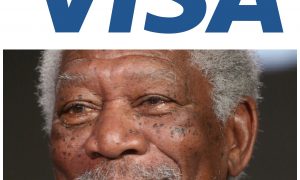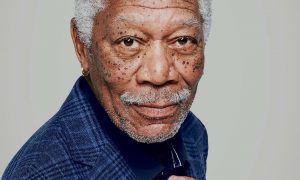“F-ck the media.”
I’m seated across from Morgan Freeman, the Oscar-winning acting legend, discussing his latest film Five Flights Up. One of the through lines of the movie, a sweet little rom-com also starring Diane Keaton, is a young Muslim man whose truck has been stopped by the NYPD on a bridge. A televised standoff ensues, with media figures and the public wildly speculating about the cause of the stop. Most, as is their wont, immediately jump to the “he has a bomb” conclusion.
“Isn’t that always happening?” says Freeman of the media’s penchant for unsubstantiated, biased conjecture during live news events. “Look at MSNBC, Fox News, and CNN. Go between those three. There’s a take, there’s a take, and there’s a take. It’s just commentary. CNN wants to be pure news, but the others are just commentary. They’re just commenting on things.”
Which brings us to the TV news media’s coverage of the Baltimore protests in the wake of the death of Freddie Gray, a 25-year-old African-American who was arrested on April 19 for possession of a switchblade. He was later found dead while in police custody, having sustained injuries to his spinal cord and larynx.
“People are saying, ‘You were not all there when we were just talking and trying to make a point, but if we set something on fire, all of a sudden you’re all here. Why is that? What’s the difference?’”
Citywide protests ensued, and while some were peaceful, the media focused all of its coverage on the rioting in near-pornographic fashion, leading journalist and African-American scholar Ta-Nehisi Coates to comment, “Cameras actually distort the story. The story already happened. The story began with policy and apexed with Freddie Gray’s death. The story is simple. Gray died in state custody. Unlikely anyone will be punished. (Which explains the riots.) That’s pretty much it. The cameras aren’t actually adding to the ‘story.’ They can’t really clarify the narrative.”
Freeman says the Baltimore coverage, while fairly biased in its focus on the rioting, has been an improvement over the very one-sided coverage of the Ferguson protests in the wake of Michael Brown’s death. “Now, they’re getting more of the whole picture. Ferguson? No. Baltimore seems to be coming up with a different scenario in the background,” says Freeman. “People are saying, ‘You were not all there when we were just talking and trying to make a point, but if we set something on fire, all of a sudden you’re all here. Why is that? What’s the difference?’ And some young reporters are listening. That sort of observation is very useful.”
“The other thing is that technology lets us see behind the scenes a little bit better,” he continues. “Police have a standard reaction to shooting somebody. I fear for my life and I fear for my safety. Now, at least you can see, ‘Hey, his hands were up in the air! What part of your safety were you afraid of? The guy was running away, what part of your safety was in danger?’ There was one situation I saw where a cop told a guy to get out of the car, said, ‘Show me your driver’s license,’ and the guy reached back into the car and the cop shot him!”
“Anyway, off the media,” he says, waving his hands in the air and chuckling. “F-ck the media.”
This is a portion of a larger interview with Morgan Freeman which will run next week.
Source: The Daily Beast















































































































































































































































![[Video] Chicago Police Officers Caught On Video Telling Two Black Men "We Kill Mother F**kers"](https://earhustle411.com/wp-content/uploads/2018/07/evil-cop-3-300x180.jpg)
![[Video] Chicago Police Officers Caught On Video Telling Two Black Men "We Kill Mother F**kers"](https://earhustle411.com/wp-content/uploads/2018/07/evil-cop-3-80x80.jpg)












![[Video] White Woman Calls The Cops On Black Real Estate Investor, Cops Threaten To Arrest Her For Harassing Him](https://earhustle411.com/wp-content/uploads/2018/05/nosy-neighbor-300x180.png)
![[Video] White Woman Calls The Cops On Black Real Estate Investor, Cops Threaten To Arrest Her For Harassing Him](https://earhustle411.com/wp-content/uploads/2018/05/nosy-neighbor-80x80.png)


![White Scientist Says The Black Community Is Being Targeted By The Medical System, They Are Deliberatly Being Poisoned [Video]](https://earhustle411.com/wp-content/uploads/2016/05/mike-adams-300x180.jpg)
![White Scientist Says The Black Community Is Being Targeted By The Medical System, They Are Deliberatly Being Poisoned [Video]](https://earhustle411.com/wp-content/uploads/2016/05/mike-adams-80x80.jpg)








![Teenage Girl Shot In Her Stomach Three Times But Took Time To Post To Facebook [ Video]](https://earhustle411.com/wp-content/uploads/2016/02/Gangster-chick-300x180.jpg)
![Teenage Girl Shot In Her Stomach Three Times But Took Time To Post To Facebook [ Video]](https://earhustle411.com/wp-content/uploads/2016/02/Gangster-chick-80x80.jpg)







